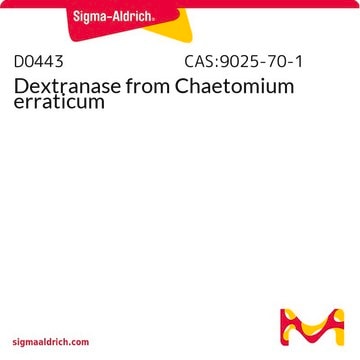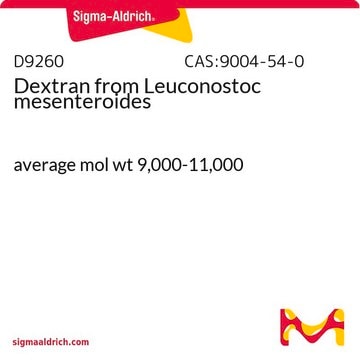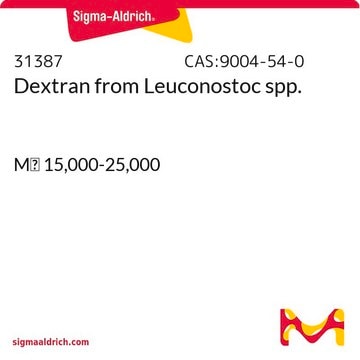D5884
Dextranase from Penicillium sp.
lyophilized powder, 10-25 units/mg solid
Synonim(y):
1,6-α-D-Glucan 6-glucanohydrolase
Zaloguj sięWyświetlanie cen organizacyjnych i kontraktowych
About This Item
Polecane produkty
Postać
lyophilized powder
aktywność właściwa
10-25 units/mg solid
temp. przechowywania
2-8°C
Szukasz podobnych produktów? Odwiedź Przewodnik dotyczący porównywania produktów
Zastosowanie
Dextranase from Penicillium sp. has been used in a study to assess a new method of synthesizing biopolymeric affinity ligands. Dextranase from Penicillium sp. Has also been used in a study to investigate the cloning and sequencing of a dextranase-encoding cDNA from Penicillium minioluteum.
Dextranase from Sigma has been used for the hydrolysis of carbohydate polymers, during the study of polysaccharide synthesis by Phanerochaete chrysosporium. It has also been used in the synthesis of new enzymatically degradable thermo-responsive nanogels.
Działania biochem./fizjol.
An endodextranase that hydrolyzes α-(1,6)-glucosidic linkages in dextran. Dextrans are undesirable compounds synthesized from sucrose by microbial contaminants during sugar production. They increase viscosity of the flow and decrease industrial recovery. Dextranase has been used for hydrolyzing dextran at sugar mills in order to improve efficiency of sugar production.
Jakość
Crude
Definicja jednostki
One unit will liberate 1.0 μmole of isomaltose (measured as maltose) per min at pH 6.0 at 37 °C, using dextran as substrate.
Inne uwagi
View more information on enzymes for complex carbohydrate analysis at www.sigma-aldrich.com/enzymeexplorer
This page may contain text that has been machine translated.
Hasło ostrzegawcze
Danger
Zwroty wskazujące rodzaj zagrożenia
Zwroty wskazujące środki ostrożności
Klasyfikacja zagrożeń
Resp. Sens. 1
Kod klasy składowania
11 - Combustible Solids
Klasa zagrożenia wodnego (WGK)
WGK 1
Temperatura zapłonu (°F)
Not applicable
Temperatura zapłonu (°C)
Not applicable
Środki ochrony indywidualnej
Eyeshields, Gloves, type N95 (US)
Certyfikaty analizy (CoA)
Poszukaj Certyfikaty analizy (CoA), wpisując numer partii/serii produktów. Numery serii i partii można znaleźć na etykiecie produktu po słowach „seria” lub „partia”.
Masz już ten produkt?
Dokumenty związane z niedawno zakupionymi produktami zostały zamieszczone w Bibliotece dokumentów.
Klienci oglądali również te produkty
G S Chaga et al.
Biotechnology and applied biochemistry, 26 ( Pt 1), 7-14 (1997-08-01)
(1) A new concept for producing soluble polymeric affinity ligands is proposed and exemplified. By solid-phase synthesis, an insoluble hydrophilic polymer is converted into an affinity gel. The gel is hydrolytically degraded to water-soluble affinity polymeric ligands which are recovered
H Roca et al.
Yeast (Chichester, England), 12(12), 1187-1200 (1996-09-30)
The DEX gene encoding an extracellular dextranase was isolated from the genomic DNA library of Penicillium minioluteum by hybridization using the dextranase cDNA as a probe. Comparison of the gene and cDNA sequences revealed that the DEX gene does not
Synthesis of new enzymatically degradable thermo-responsive nanogels.
Aguirre, G., Ramos, J., & Forcada, J
Soft Matter, 9(1), 261-270 (2013)
Polysaccharide synthesis by Phanerochaete chrysosporium during degradation of kraft lignin
Leisola M, et al.
Europ. J. Appl. Microbiol. Biotechnol., 15(3), 180-184 (1982)
B Garcia et al.
FEMS microbiology letters, 143(2-3), 175-183 (1996-10-01)
A cDNA from Penicillium minioluteum HI-4 encoding a dextranase (1,6-alpha-glucan hydrolase, EC 3.2.1.11) was isolated and characterized. cDNA clones corresponding to genes expressed in dextran-induced cultures were identified by differential hybridization. Southern hybridization and restriction mapping analysis of selected clones
Nasz zespół naukowców ma doświadczenie we wszystkich obszarach badań, w tym w naukach przyrodniczych, materiałoznawstwie, syntezie chemicznej, chromatografii, analityce i wielu innych dziedzinach.
Skontaktuj się z zespołem ds. pomocy technicznej













